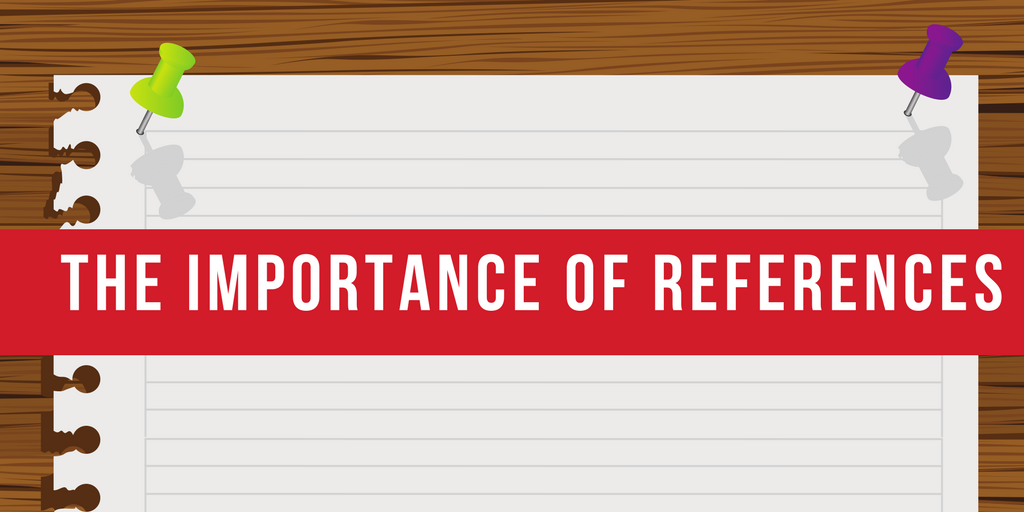;)
References: They Can Make Or Break You
| July 6, 2017| InterviewsWhile candidates are busy pouring over their resumes to make sure everything is perfect down to the punctuation, there seems to be one part of the job seeking process that people snooze on. Be honest: how much time did you actually spend compiling your reference list?
If you had to pause and think, then it’s time for an overhaul that will make your job search more lucrative. Resumes and cover letters are important, but what many don’t realize is that your reference list is equally as important –and can make or break an offer for employment.
“But people don’t check references anymore.”
It’s true that some companies gloss over references and won’t reach out. But should you really take that risk? A majority of companies still rely heavily on references, and if you don’t take the time to make sure you create a list of contacts who will speak to your accomplishments, another candidate that receives glowing reviews will end up in the position you were seeking.
In fact, a 2016 survey conducted by The Society for Human Resource Management (SHRM) found that references were among the top three methods hiring managers from different industries used to select candidates. Considering that 77% of hiring managers have uncovered false statements on a resume, employers are looking to confirm the accomplishments and skills you’ve listed to make sure everything checks out.
Ideally, you should have between three and five people lined up as your references. Different positions will require different types of references, so it’s smart to have backups. When choosing who to list, consider several things:
- How long did you work with this person? Do they know you well enough to vouch for your accomplishments?
- When did you work together? Have you kept in touch? If you haven’t spoken to this person in a while or haven’t worked with them for several years, will they be able to provide an accurate summary of your performance and skillset?
- How might this person explain your qualities to a potential employer? If you choose to list someone you clashed with, do you think they will give you a positive and professional review?
- Are you providing the type of references they are looking for? If a company asks for a professional reference or someone you reported to, make sure you give them just that as opposed to a co-worker or friend.
- Is all the contact information accurate? It can be frustrating for a hiring manager to collect references from a candidate only to see that the telephone numbers are no longer in service and or the email address is incorrect. Also, be sure contact names are spelled correctly along with their job title, company and the position you held. If an employer can’t get in touch with your references, you risk the chance of not being offered the position.
The key is to choose people who will speak highly about your qualities, both personally and professionally. Don’t make the mistake of selecting someone you’ve had very little interaction with, as they won’t be able to accurately describe your achievements.
It’s best to diversify your references and chose a mix of contacts that will give a broad overview of who you are and your work habits. Recruiters are looking to verify your work history including strengths and weaknesses, confirmation of employment dates and relevant accomplishments. Think about the type of people who are likely to provide that information. Here are some suggestions:
- Former employer: They can give a good insight about your work ethic, how you take direction and your professional growth on the job.
- Professor or Advisor: Depending on how recently you are out of school, it might be beneficial to reach out to a professor or advisor whom you formed a close relationship with. They will be able to speak to how you performed academically, what leadership roles you assumed, etc.
- Supervisor: This person does not have to be work related. If there is someone who supervised you for a volunteer project and can discuss your capabilities, add them to your reference list.
- Colleague: Choose someone you worked with who can attest to your teamwork and group achievements.
Although it may seem tempting, avoid listing a relative or spouse as a reference. Employers know these people will have a bias when speaking about you and usually won’t consider them a credible resource. While most positions ask for a professional reference, if a position is looking for a character reference it is okay to list a long-time friend. Whoever you do choose, make sure they’re aware someone may be contacting them so they aren’t surprised when they receive that email or call.
Remember to keep your reference list up-to-date. Remove anyone you are no longer in contact with. If your reference has changed companies, has a new phone number or email address update accordingly so they are readily available for employers to reach.
Even if you’re not job hunting you should review your reference list routinely, to assure they are still viable references. This way when it’s time to make your career leap you’ll have all the information you need. While this might add an extra step to your job search, the end results are more than worth it. One stellar reference could be what sets you apart from the rest.
